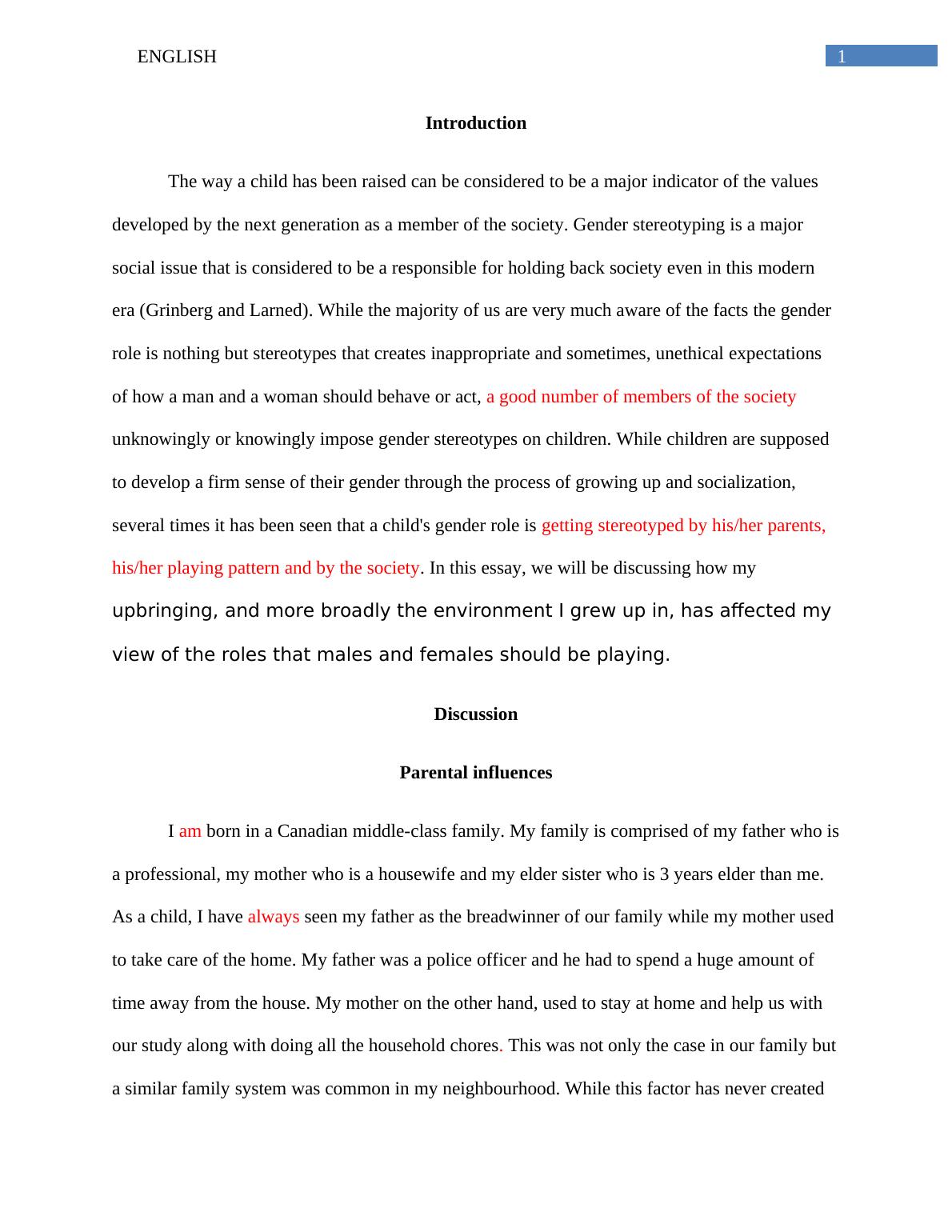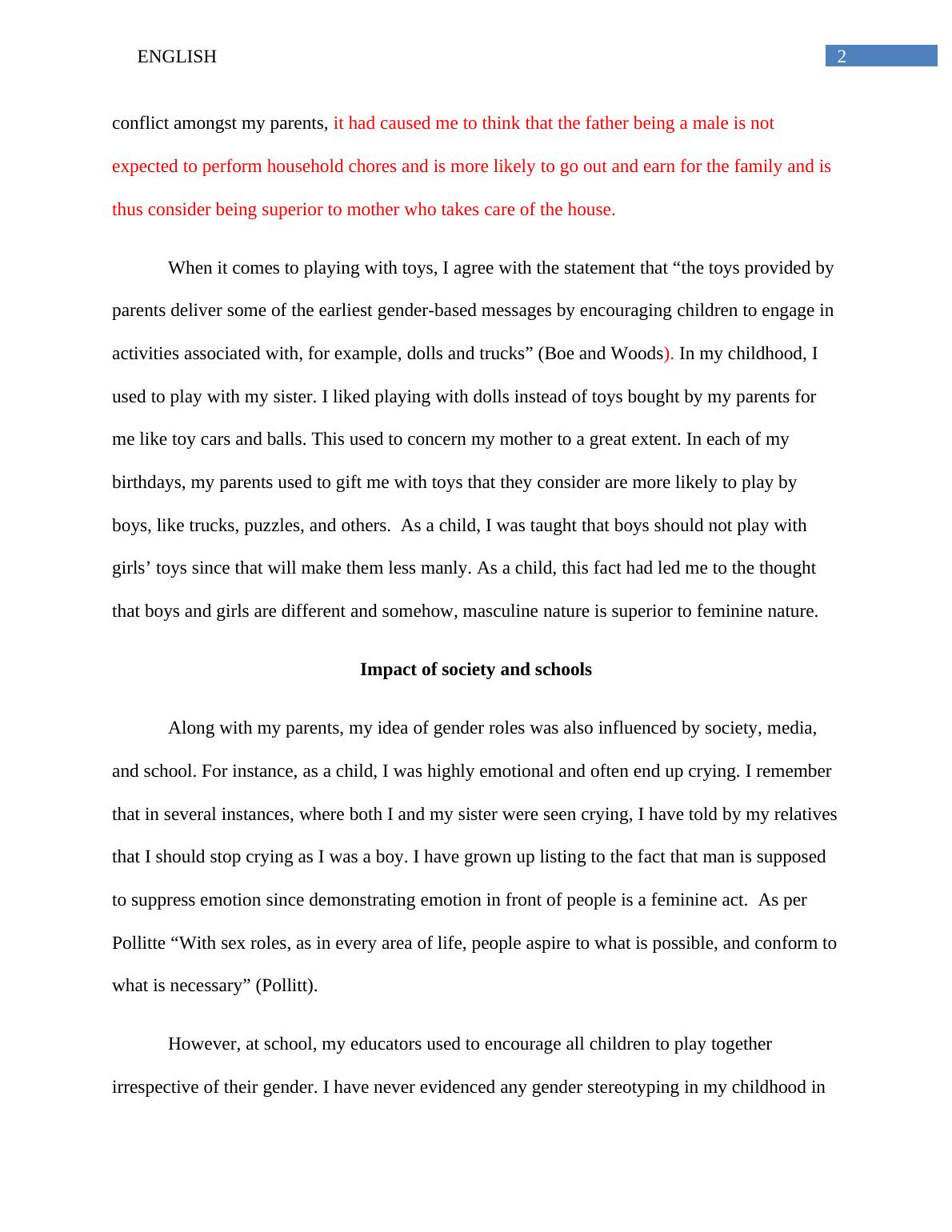My family is comprised of my father
Added on 2022-09-13
6 Pages1449 Words15 Views
Running head: ENGLISH
English
Name of the Student
Name of the University
English
Name of the Student
Name of the University

1ENGLISH
Introduction
The way a child has been raised can be considered to be a major indicator of the values
developed by the next generation as a member of the society. Gender stereotyping is a major
social issue that is considered to be a responsible for holding back society even in this modern
era (Grinberg and Larned). While the majority of us are very much aware of the facts the gender
role is nothing but stereotypes that creates inappropriate and sometimes, unethical expectations
of how a man and a woman should behave or act, a good number of members of the society
unknowingly or knowingly impose gender stereotypes on children. While children are supposed
to develop a firm sense of their gender through the process of growing up and socialization,
several times it has been seen that a child's gender role is getting stereotyped by his/her parents,
his/her playing pattern and by the society. In this essay, we will be discussing how my
upbringing, and more broadly the environment I grew up in, has affected my
view of the roles that males and females should be playing.
Discussion
Parental influences
I am born in a Canadian middle-class family. My family is comprised of my father who is
a professional, my mother who is a housewife and my elder sister who is 3 years elder than me.
As a child, I have always seen my father as the breadwinner of our family while my mother used
to take care of the home. My father was a police officer and he had to spend a huge amount of
time away from the house. My mother on the other hand, used to stay at home and help us with
our study along with doing all the household chores. This was not only the case in our family but
a similar family system was common in my neighbourhood. While this factor has never created
Introduction
The way a child has been raised can be considered to be a major indicator of the values
developed by the next generation as a member of the society. Gender stereotyping is a major
social issue that is considered to be a responsible for holding back society even in this modern
era (Grinberg and Larned). While the majority of us are very much aware of the facts the gender
role is nothing but stereotypes that creates inappropriate and sometimes, unethical expectations
of how a man and a woman should behave or act, a good number of members of the society
unknowingly or knowingly impose gender stereotypes on children. While children are supposed
to develop a firm sense of their gender through the process of growing up and socialization,
several times it has been seen that a child's gender role is getting stereotyped by his/her parents,
his/her playing pattern and by the society. In this essay, we will be discussing how my
upbringing, and more broadly the environment I grew up in, has affected my
view of the roles that males and females should be playing.
Discussion
Parental influences
I am born in a Canadian middle-class family. My family is comprised of my father who is
a professional, my mother who is a housewife and my elder sister who is 3 years elder than me.
As a child, I have always seen my father as the breadwinner of our family while my mother used
to take care of the home. My father was a police officer and he had to spend a huge amount of
time away from the house. My mother on the other hand, used to stay at home and help us with
our study along with doing all the household chores. This was not only the case in our family but
a similar family system was common in my neighbourhood. While this factor has never created

2ENGLISH
conflict amongst my parents, it had caused me to think that the father being a male is not
expected to perform household chores and is more likely to go out and earn for the family and is
thus consider being superior to mother who takes care of the house.
When it comes to playing with toys, I agree with the statement that “the toys provided by
parents deliver some of the earliest gender-based messages by encouraging children to engage in
activities associated with, for example, dolls and trucks” (Boe and Woods). In my childhood, I
used to play with my sister. I liked playing with dolls instead of toys bought by my parents for
me like toy cars and balls. This used to concern my mother to a great extent. In each of my
birthdays, my parents used to gift me with toys that they consider are more likely to play by
boys, like trucks, puzzles, and others. As a child, I was taught that boys should not play with
girls’ toys since that will make them less manly. As a child, this fact had led me to the thought
that boys and girls are different and somehow, masculine nature is superior to feminine nature.
Impact of society and schools
Along with my parents, my idea of gender roles was also influenced by society, media,
and school. For instance, as a child, I was highly emotional and often end up crying. I remember
that in several instances, where both I and my sister were seen crying, I have told by my relatives
that I should stop crying as I was a boy. I have grown up listing to the fact that man is supposed
to suppress emotion since demonstrating emotion in front of people is a feminine act. As per
Pollitte “With sex roles, as in every area of life, people aspire to what is possible, and conform to
what is necessary” (Pollitt).
However, at school, my educators used to encourage all children to play together
irrespective of their gender. I have never evidenced any gender stereotyping in my childhood in
conflict amongst my parents, it had caused me to think that the father being a male is not
expected to perform household chores and is more likely to go out and earn for the family and is
thus consider being superior to mother who takes care of the house.
When it comes to playing with toys, I agree with the statement that “the toys provided by
parents deliver some of the earliest gender-based messages by encouraging children to engage in
activities associated with, for example, dolls and trucks” (Boe and Woods). In my childhood, I
used to play with my sister. I liked playing with dolls instead of toys bought by my parents for
me like toy cars and balls. This used to concern my mother to a great extent. In each of my
birthdays, my parents used to gift me with toys that they consider are more likely to play by
boys, like trucks, puzzles, and others. As a child, I was taught that boys should not play with
girls’ toys since that will make them less manly. As a child, this fact had led me to the thought
that boys and girls are different and somehow, masculine nature is superior to feminine nature.
Impact of society and schools
Along with my parents, my idea of gender roles was also influenced by society, media,
and school. For instance, as a child, I was highly emotional and often end up crying. I remember
that in several instances, where both I and my sister were seen crying, I have told by my relatives
that I should stop crying as I was a boy. I have grown up listing to the fact that man is supposed
to suppress emotion since demonstrating emotion in front of people is a feminine act. As per
Pollitte “With sex roles, as in every area of life, people aspire to what is possible, and conform to
what is necessary” (Pollitt).
However, at school, my educators used to encourage all children to play together
irrespective of their gender. I have never evidenced any gender stereotyping in my childhood in

End of preview
Want to access all the pages? Upload your documents or become a member.
Related Documents
The Developmental Debate on Gender Identitylg...
|3
|373
|14
Gender Identity and Its Theories: A Comparison of Psychodynamic and Symbolic Interactionalism Approacheslg...
|4
|750
|96
Use Information about Children to Inform Practicelg...
|12
|2731
|450
Gender Stereotyping and Inequality in US Culturelg...
|8
|1976
|237
Psychological Development of a Child: A Case Study of Michaellg...
|5
|1060
|119
Family Interview HLT-324V: Transcultural Health Care College of Nursinglg...
|4
|1618
|54
